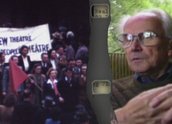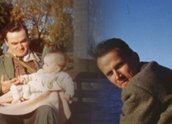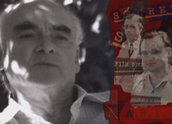


The Archive Project (2006)
Synopsis
An old suitcase filled with film remnants sparks a search for the history of Melbourne’s Realist Film Unit. Filmmaker John Hughes tracks down surviving members of the group to piece together their story and find missing films. We learn that the Realist Film Unit was driven by a conviction that Australian cinemas were dominated by escapist Hollywood films and a belief in film’s power to reflect reality and raise awareness of social issues. In the 1940s and ’50s, the unit organised screenings of European and American documentary and avant-garde cinema and made films on subjects such as living conditions in Melbourne’s inner-city slums. These activities, and the unit’s association with the Australian Communist Party, led to close surveillance by the government’s newly formed intelligence organisation, ASIO, as the paranoia of the Cold War years kicked in.
Curator’s notes
This story of a small group of film enthusiasts is also a fascinating look at the social and political climate of their time. The Archive Project examines the filmmaking and film exhibition of the Melbourne Realist Film Unit, who forged an Australian response to the censorship and surveillance culture of the Cold War years.
Much of the material Hughes and editor and co-director Uri Mizrahi work with is historical – old interviews, films, photographs and written documents. They maintain visual dynamism by layering and animating text and still images. Martin Friedel’s music adds to the film’s feeling of forward momentum and fluidity. Brief glimpses of recent scenes, such as rallies against then Prime Minister John Howard’s proposed ‘WorkChoices’ legislation, hint at contemporary parallels.
John Hughes narrates in the first person and in some moments figures as a character in the story, albeit one he tries to make ‘as recessed as possible in the narrative’, as he told australianscreen in an interview in August 2009. Hughes identifies The Archive Project as belonging to a documentary essay tradition, like many of his other films, a number of which also explore what he terms 'the interface of Australian political and cultural history’. He first discovered the Realist Film Unit while making Film-work (1981) about the Waterside Workers’ Federation Film Unit. The Archive Project also revisits moments from his earlier film on the attempted banning of the Communist Party, Menace (1976).
Among the film’s insights is the extent of both state and federal government concern about independent film societies, politically aligned or otherwise. The Victorian Government’s Cinematograph Films Bill of 1948, for instance, proposed legislation that would restrict and control all independent film screenings in the state. Hughes explained to australianscreen that:
The key clause was that films could not be screened other than in an environment that the government would authorise as a theatre or a cinema, therefore preventing all non-commercial exhibition. This is why it was defeated, because the Realists were able to explain that as well as the Realist screenings, churches and schools would be affected.
Another revelation is ASIO’s heavy surveillance of the inaugural Olinda Film Festival, later to become the Melbourne International Film Festival, with which members of the Realist Film Unit were involved. The film also explores the complex interface between art and politics in the unit’s own rocky relationship with the Communist Party.
The Archive Project is part detective story and Hughes’s search for the Unit’s missing history unearths not just information but a range of cinematic artefacts. There is a real sense of excitement surrounding the physical paraphernalia of film – the old equipment, film canisters and offcuts. There are also excerpts from more intact Realist Film Unit works like A Place to Live (1950), Prices and the People (1948), These Are Our Children (1948) and They Chose Peace (1952).
Hughes started The Archive Project as an artist in residence at ACMI. He also made a companion piece for the institution’s 2006 ‘Contemporary Commonwealth’ exhibition. This involved creating new soundtracks for some of the Realist Film Unit’s films, which were then exhibited with 'interplay’ between new and old soundtracks. Hughes’s other films include the documentaries One Way Street: Fragments for Walter Benjamin (1992), After Mabo (1997), Indonesia Calling (2009) and the feature film drama What I Have Written (1995). Read the transcript of a 2001 interview with Hughes.
The Archive Project was broadcast on ABC television in January 2007. In 2006, it screened at several film festivals including the Sydney and New Zealand Film Festivals. It won multiple awards such as the Film Critics’ Circle of Australia award for Best Feature Documentary and received AFI Award nominations in 2006 for Best Editing in a Documentary (Uri Mizrahi) and Best Sound in a Documentary (Martin Friedel, Andrew Plain, Keith Thomas and Emma Bortignon).
- Overview
- Curator’s notes
- Video 3 clips
- Principal credits
- Find a copy
- Make a comment
- Map
- Add your review



